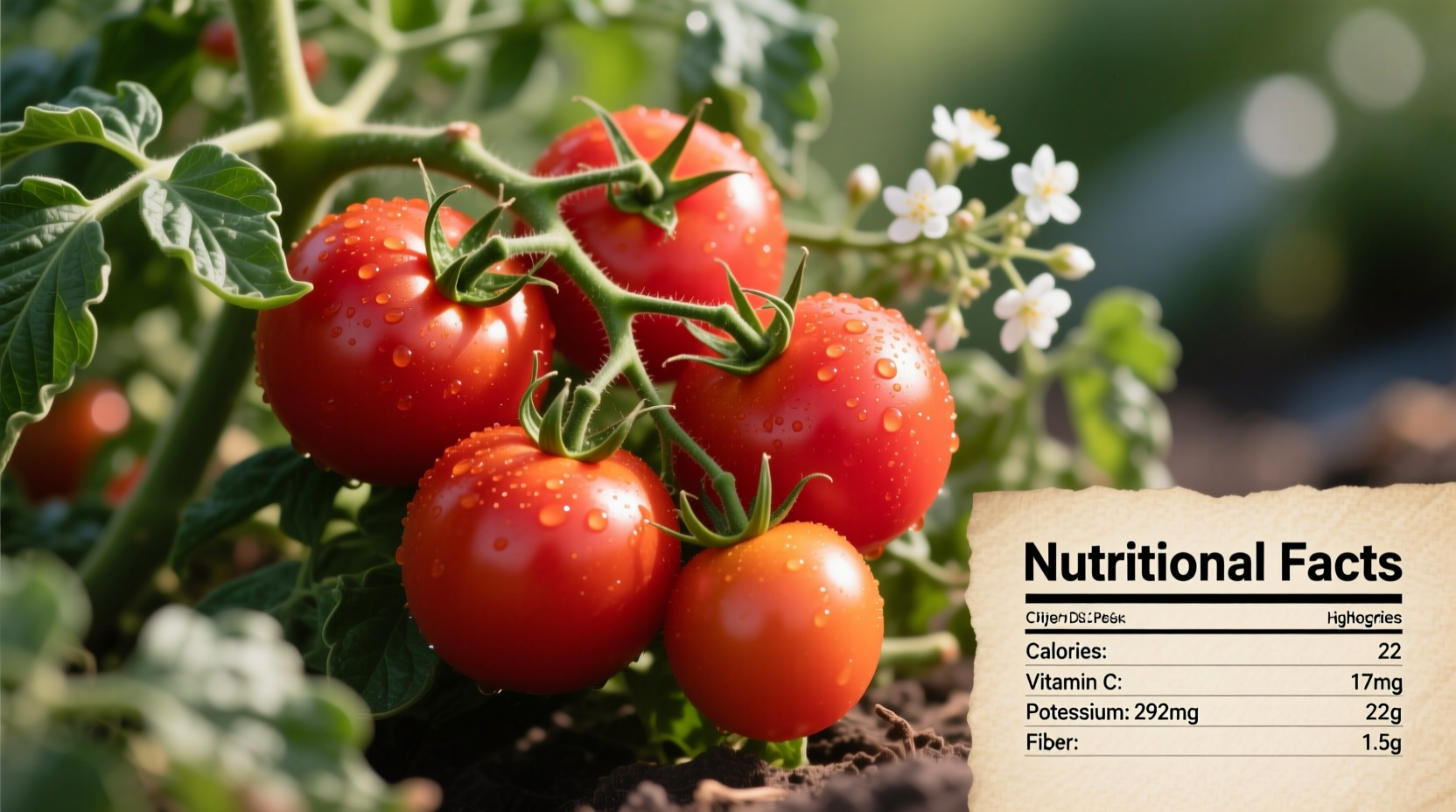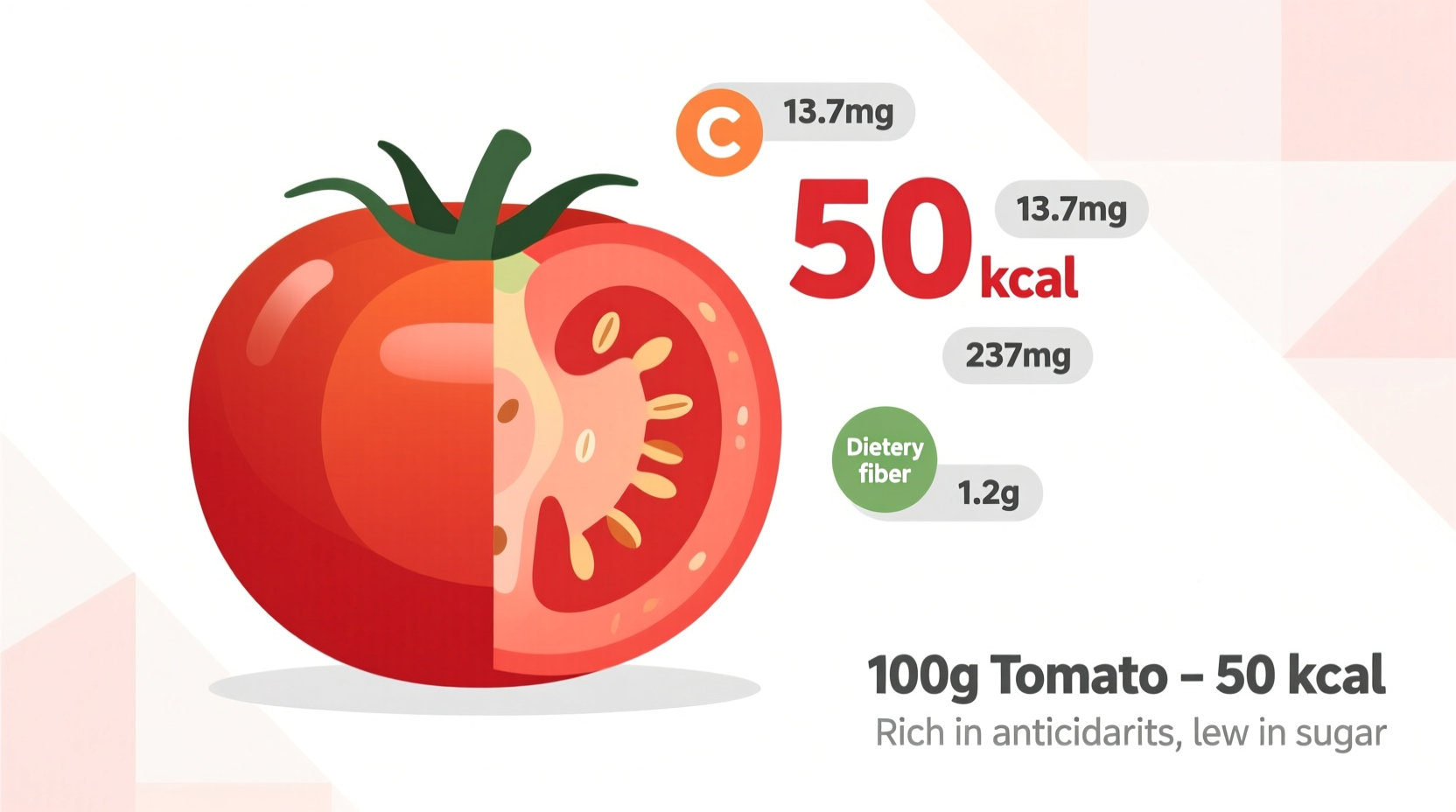100g of raw tomatoes contains exactly 18 calories, making them one of the lowest-calorie vegetables available. This serving provides 3.9g carbohydrates, 0.9g protein, 0.2g fat, and delivers 14% of your daily vitamin C needs plus significant lycopene.
When you're tracking your daily nutrition or planning a calorie-conscious meal, knowing the precise nutritional value of common ingredients is essential. If you've ever wondered how many calories are in 100g of tomatoes, you're not alone—this is one of the most frequently searched nutritional facts for vegetables worldwide.
Why Tomato Calories Matter for Your Diet
Tomatoes are a kitchen staple across global cuisines, but their nutritional profile makes them particularly valuable for health-conscious eaters. At just 18 calories per 100g, tomatoes offer exceptional nutritional density without adding significant calories to your meals. This makes them ideal for weight management diets, diabetes-friendly meal planning, and overall healthy eating patterns.
According to the USDA FoodData Central, the complete nutritional breakdown for 100g of raw tomatoes includes:
| Nutrient | Amount | % Daily Value |
|---|---|---|
| Calories | 18 kcal | 1% |
| Carbohydrates | 3.9 g | 1% |
| Dietary Fiber | 1.2 g | 4% |
| Sugars | 2.6 g | - |
| Protein | 0.9 g | 2% |
| Vitamin C | 13.7 mg | 14% |
| Vitamin K | 7.9 μg | 7% |
| Potassium | 237 mg | 5% |
Tomato Varieties and Their Caloric Differences
While most tomato varieties maintain similar calorie counts, preparation methods significantly impact the final nutritional profile. The National Institutes of Health confirms that processing tomatoes can alter their calorie density:
- Cherry tomatoes (100g): 27 calories - slightly higher due to concentrated sugars
- Cooked tomatoes (100g): 24 calories - concentration from water loss
- Sun-dried tomatoes (100g): 258 calories - significant concentration from dehydration
- Tomato sauce (100g): 44 calories - varies by recipe and added ingredients

How Tomatoes Fit Into Your Daily Nutrition Goals
Understanding tomato calories per 100g becomes practical when applied to real-world portions. A medium-sized tomato (approximately 123g) contains just 22 calories, making it an excellent low-calorie addition to any meal. Registered dietitians commonly recommend including tomatoes in:
- Weight loss diets: Add volume to meals without significant calories
- Diabetes management: Low glycemic index (28-38) with minimal impact on blood sugar
- Heart-healthy eating: Potassium content supports healthy blood pressure
- Antioxidant-rich diets: Lycopene content increases when cooked with healthy fats
Tomatoes vs. Other Common Vegetables: Calorie Comparison
When evaluating calories in 100g of tomato against other vegetables, tomatoes rank among the lowest-calorie options available:
| Vegetable (100g) | Calories | Carbohydrates | Notable Nutrients |
|---|---|---|---|
| Tomato | 18 | 3.9g | Vitamin C, Lycopene |
| Cucumber | 15 | 3.6g | Vitamin K, Potassium |
| Zucchini | 17 | 3.1g | Vitamin A, Manganese |
| Spinach (raw) | 23 | 3.6g | Vitamin K, Iron, Folate |
| Carrot | 41 | 9.6g | Vitamin A, Fiber |
Maximizing Tomato Nutrition in Your Meals
To get the most nutritional benefit from tomatoes while maintaining their low-calorie advantage, consider these evidence-based strategies from the Journal of Agricultural and Food Chemistry:
- Cook with healthy fats: Lycopene absorption increases by 2.5x when tomatoes are cooked with olive oil
- Avoid excessive processing: Fresh tomatoes retain more vitamin C than processed forms
- Pair with complementary foods: Combine with bell peppers for enhanced vitamin C absorption
- Store properly: Keep at room temperature until fully ripe, then refrigerate to maintain nutrients
Common Misconceptions About Tomato Calories
Despite their straightforward nutritional profile, several misconceptions persist about tomato calories per 100g:
- "All tomatoes have the same calorie count" - Cherry tomatoes contain about 50% more calories than standard varieties due to higher sugar concentration
- "Cooking destroys all nutrients" - While vitamin C decreases with cooking, lycopene bioavailability increases significantly
- "Tomato products are just as healthy as fresh tomatoes" - Many commercial sauces contain added sugars and sodium that dramatically alter the nutritional profile
Practical Applications for Daily Eating
Knowing the exact calories in 100g of tomato becomes valuable when planning specific dietary approaches:
- For weight management: Add 200g of tomatoes (36 calories) to salads for volume without significant calorie impact
- For Mediterranean diet followers: Incorporate tomatoes as a primary vegetable source, aiming for 2-3 servings daily
- For athletes: Use tomato-based sauces for post-workout meals to provide hydration and electrolytes
- For blood pressure management: Consume tomatoes regularly for their potassium content, which helps balance sodium effects
Tomato Nutrition Through the Seasons
Research from the Journal of Food Composition and Analysis shows that tomato nutritional content varies by season:
- Summer-harvested tomatoes: Highest lycopene content (up to 50% more than winter varieties)
- Winter greenhouse tomatoes: Slightly lower vitamin C but more consistent nutrient profile
- Vine-ripened vs. picked green: Vine-ripened tomatoes contain 20-30% more antioxidants
This seasonal variation explains why fresh summer tomatoes often taste sweeter and provide slightly more nutritional benefits than off-season varieties.
FAQs About Tomato Calories
How many calories are in 100g of tomatoes?
100g of raw tomatoes contains exactly 18 calories according to the USDA FoodData Central database. This serving provides 3.9g carbohydrates, 0.9g protein, and 0.2g fat, making tomatoes one of the lowest-calorie vegetables available.
Are tomatoes good for weight loss?
Yes, tomatoes are excellent for weight loss due to their low calorie density (only 18 calories per 100g) and high water content (95%). They add volume and nutrients to meals without significant calories, helping you feel full while maintaining a calorie deficit.
Do different tomato varieties have different calorie counts?
Yes, while standard tomatoes contain 18 calories per 100g, cherry tomatoes have about 27 calories per 100g due to higher sugar concentration. Sun-dried tomatoes are significantly higher at 258 calories per 100g because of water removal, while tomato sauce averages 44 calories per 100g depending on preparation.
Does cooking tomatoes change their calorie content?
Cooking concentrates calories slightly as water evaporates. Raw tomatoes have 18 calories per 100g, while cooked tomatoes contain about 24 calories per 100g. However, cooking increases the bioavailability of lycopene, making the nutritional benefits greater despite the slight calorie increase.
How many tomatoes can I eat on a 1,200-calorie diet?
On a 1,200-calorie diet, you could eat approximately 6,667g (over 14 pounds) of tomatoes and stay within your calorie limit, though this isn't nutritionally balanced. A more practical approach would be 300-500g of tomatoes daily (54-90 calories), which provides significant nutrients without compromising other essential food groups.











 浙公网安备
33010002000092号
浙公网安备
33010002000092号 浙B2-20120091-4
浙B2-20120091-4